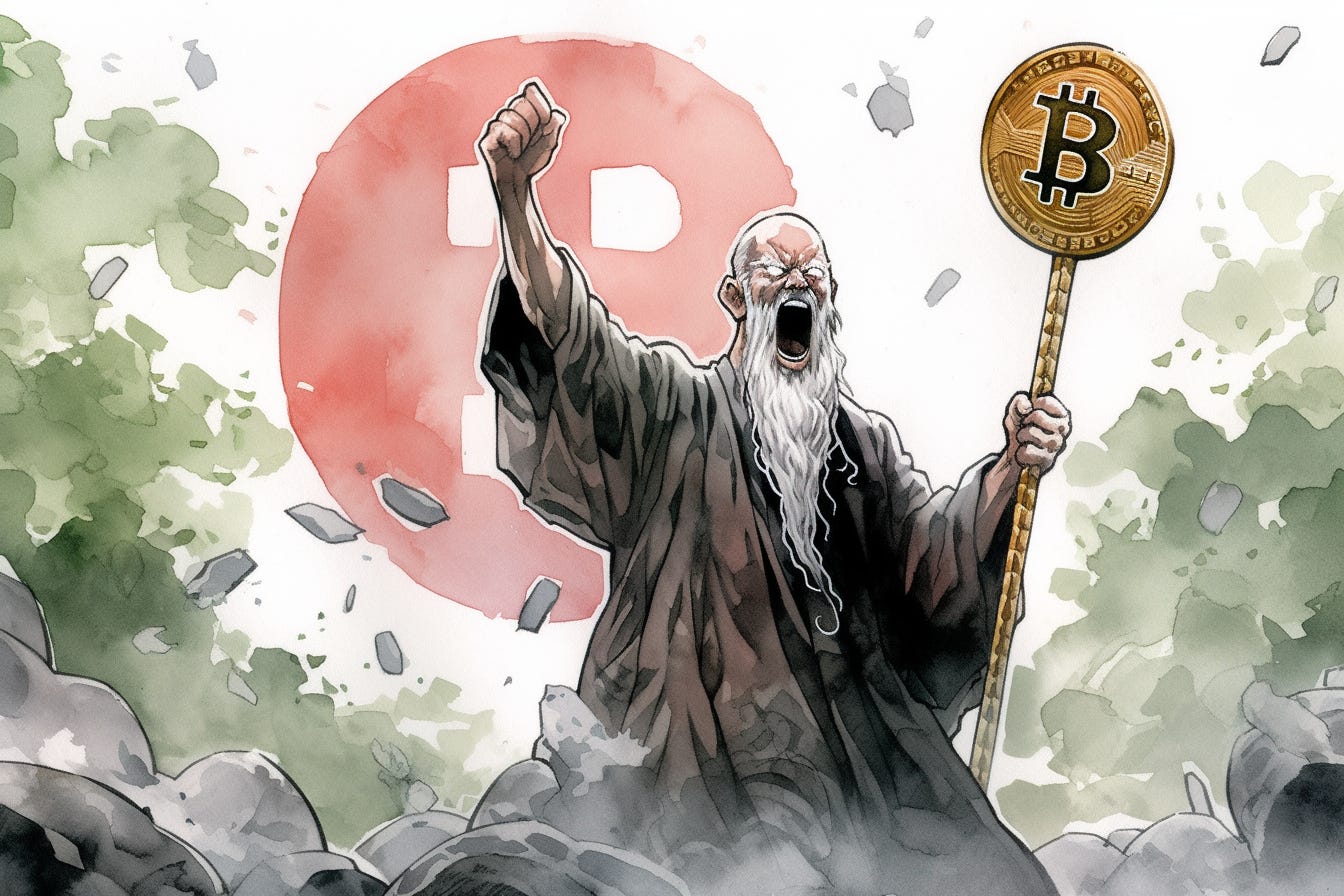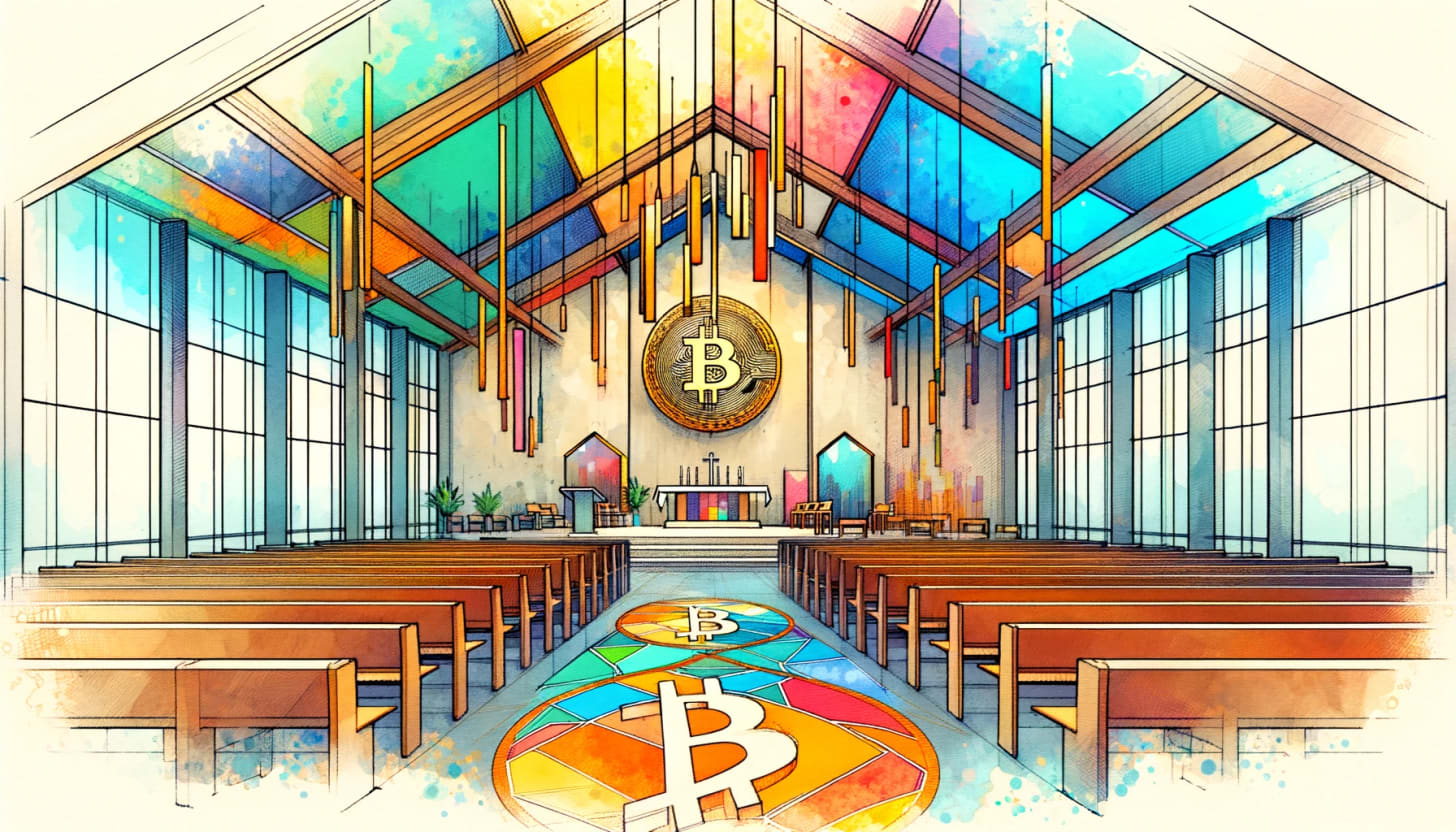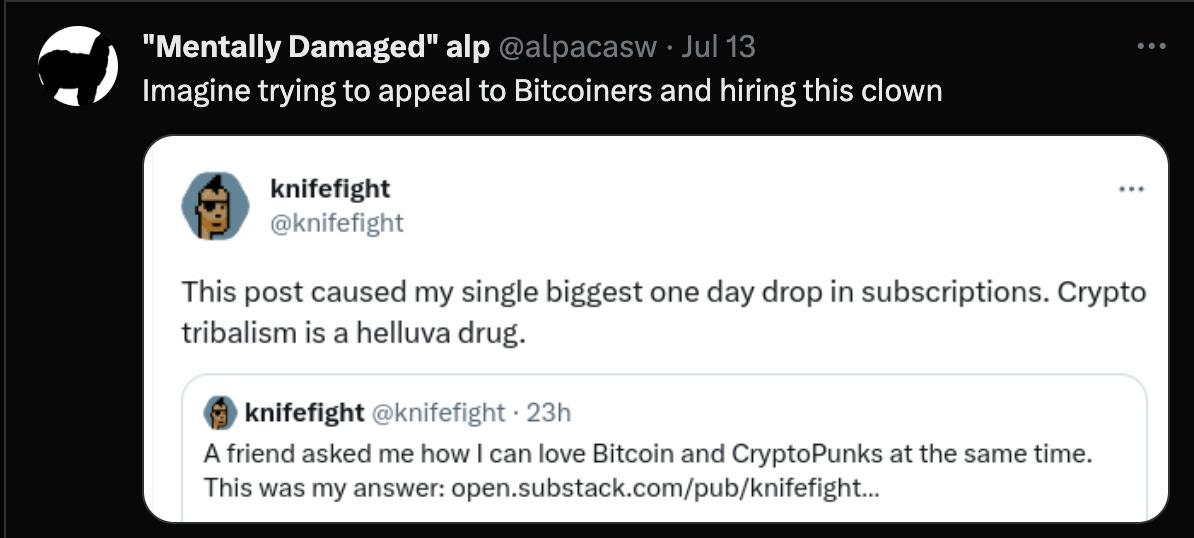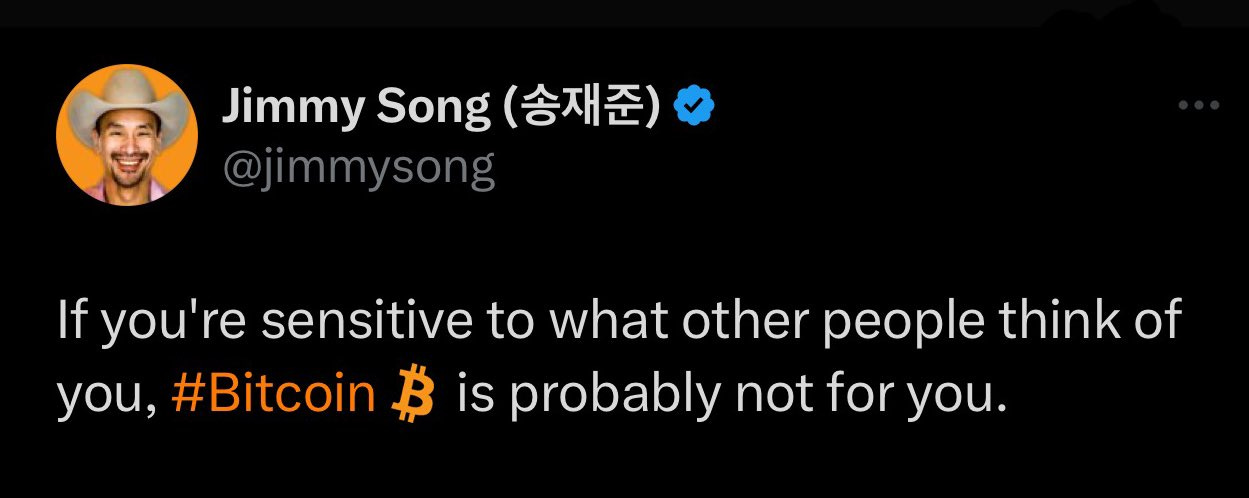The cult of Bitcoin culture
A vocal religious minority is trying to hijack the Bitcoin project
Inside this issue:
The cult of Bitcoin culture
Immanentizing the eschaton
In the eyes of the faithful, doubt is a sin
The cult of Bitcoin culture
I’ve been writing about Something Interesting for almost three years now and before that I had been writing about Bitcoin on Medium since 2017. Over those years the number of people using Bitcoin has grown dramatically — but somehow the definition of what it means to be a "Bitcoiner" has steadily narrowed.
Bitcoin enthusiasts and Bitcoin skeptics both tend to call it a cult — the former affectionately, the latter derisively. It is entirely possible to love Bitcoin without worshipping it — but it is much easier to worship it and as a result there are more worshippers than realists. Over time their chanting has gotten louder and simpler and increasingly tribal: Orange coin good. Everything else bad.
This noisy and obnoxious tribe is wrong. Bitcoin does not have a culture. Anyone can use it. You don’t have to vote libertarian or hate fractional reserve banks or eat meat or care about sound money or abstain from shitcoins or promise to always keep Satoshi in your heart. Bitcoin is neutral. That’s literally the point. The people engaged in the construction of Bitcoin 'culture' are not serving the cause of Bitcoin in the real world. They are just looking for friends who enjoy LARPing in the same fictional universe.
Immanentizing the eschaton
The creation and enforcement of Bitcoin dogma does not advance Bitcoin — it isn’t even about Bitcoin. It is mostly about itself. Mission creep has already expanded the mandate from promoting sound money to opposing perceived cultural enemies like NFT enthusiasts or fractional reserve banks. Many of its loudest advocates share a host of completely unrelated interests: gun culture, classical art, climate skepticism, carnivore diets, the practice of Christianity.
None of these things have anything to do with Bitcoin. Bitcoin is not a religion and collective faith is not a useful way to understand it. Whether they know it or not the self-appointed high priests of Bitcoin orthodoxy are essentially running an affinity scam, co-opting the language and aesthetics of Bitcoin to artificially elevate their own importance. They might love Bitcoin, but they don’t understand it.
Rather than trying to convince the world to embrace Bitcoin, the cultists have built ever narrower definitions of who actually qualifies as a Bitcoiner. Obviously purity tests about third-party custody or speculating on altcoins don’t do anything to help expand Bitcoin adoption — but like any doomsday cult, the Bitcoin maxis don’t feel any urge to help the unworthy avoid damnation. Their focus is not on practical work to improve the world as it exists, but on the holy work of immanentizing the eschaton, accelerating and preparing for the inevitable coming utopia.
Bitcoin cultists oppose developing new accessible ways for people to use Bitcoin for the same reason that medieval Catholic priests objected to German translations of the Latin Bible. They are less concerned about advancing the philosophy of their religion than they are about preserving their status within it. Being exclusive makes them feel elite. They have no desire for ordinary people to see the face of God.
That’s why companies that have onboarded millions of Bitcoin users [e.g. Coinbase and Binance] are enemy-coded and every new sidechain proposal hits a hype cycle before the whitepaper ink is dry. The cultists don’t want to find ways to improve Bitcoin, they want to find the proof that Bitcoin was perfect already. They don’t want to advance Bitcoin adoption, they take adoption for granted as preordained. Their faith in Bitcoin makes them complacent.
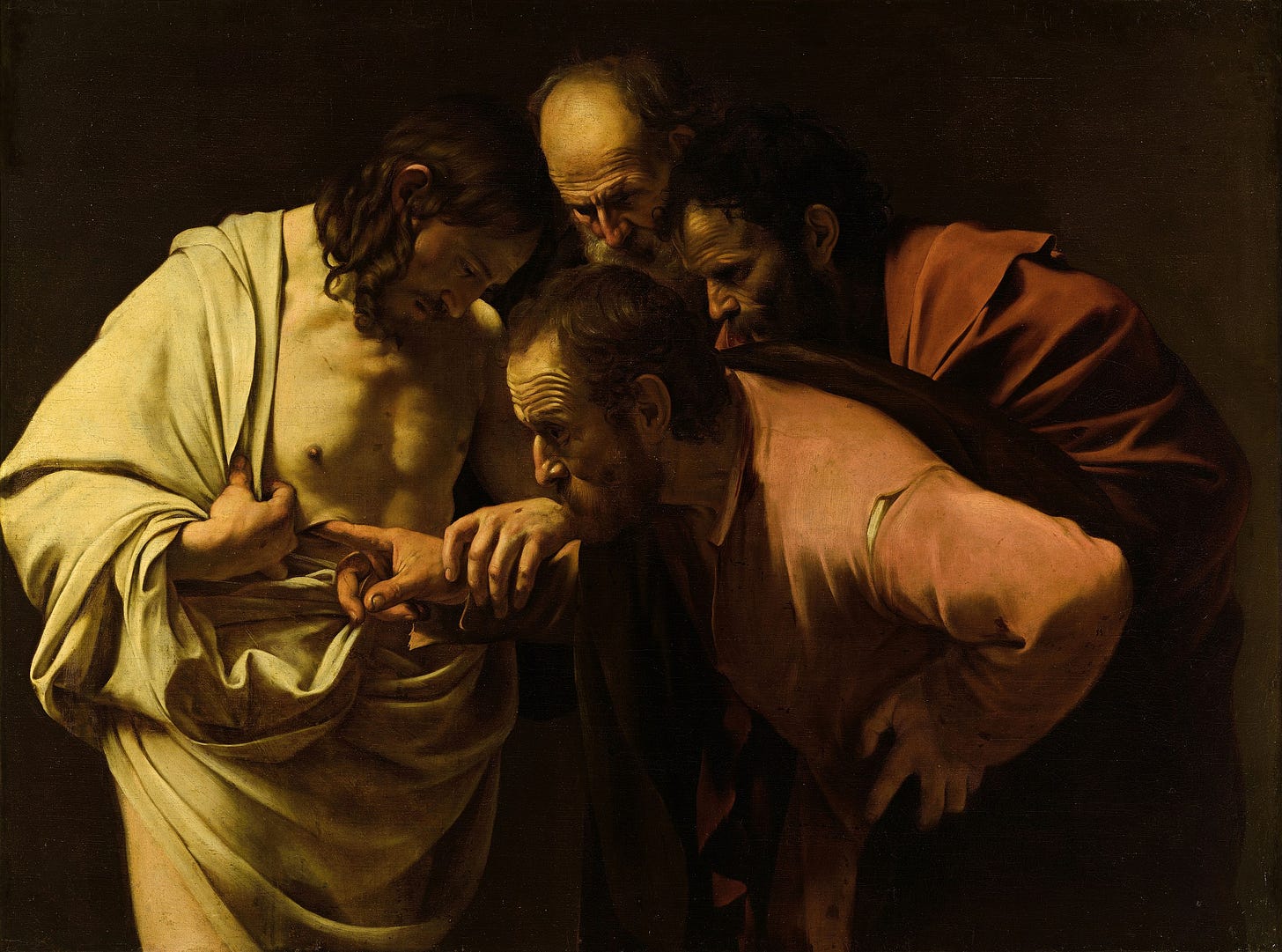
In the eyes of the faithful, doubt is a sin
I knew as I joined the Bitcoin industry that I was a tribal mismatch. I don’t mind being an outsider, usually. I was looking forward to having interesting debates — defending my nuanced views about things like NFTs and self-custody while learning the more sophisticated critiques and perspectives of my colleagues and peers at other Bitcoin companies. In practice that never really happened — mostly, I was politely ignored, like a fart on a Zoom call.
The Limits of self custody first started as a Google doc that I shared internally hoping for feedback on what I was missing or how our corporate strategy planned to navigate those challenges. Eventually I gave up on having that conversation internally and I published a version of it to Something Interesting, figuring at least I could discuss the ideas with my own small audience.
Outside of Blockstream, critics were not polite enough to ignore my wrongthink. My tweet thread linking to the post went mildly viral (in the bad way). Coworkers posted screenshots to publicly dunk on me without bothering to talk to me. The CEO of a partner company tagged my CEO to warn him about my errant ways. Internally, a slack channel was started with several of my coworkers and my CEO (but not me) to discuss whether I could really be trusted.
No one argued that I was wrong (factually) — the central complaint was that I was wrong (morally). I wasn’t keeping the faith. The limits of self custody doesn’t actually make any recommendations or advocate for any specific actions. It’s just a neutral, descriptive observation of some difficult realities of decentralization. But even a neutrally voiced observation about the practical limits of the system is an attack on the doctrine of Bitcoin’s Divine Perfection.
The self-custody post was the worst example, but it’s hardly an isolated one. Here’s another from a more recent post about CryptoPunks:
If you are a long time reader wondering why my posts became so infrequent, this is a big part of why. Knowing that any deviant thoughts will be ridiculed by my peers and submitted to my boss’s boss as evidence of my apostasy was … demotivating.
It’s also bad for Bitcoin, of course. Bullying me into silence did nothing to address or invalidate the concerns I was trying to raise. Faith that everything will work out isn’t a strategy — at best it’s an anesthetic. But the cultists don’t care, because they don’t actually want adoption. They would prefer for their niche subculture remain niche. They are more interested in devising purity tests to identify the worthy than in finding ways for Bitcoin to serve a wider range of people.
To be clear, not every Bitcoiner is a cultist. But the cultists have successfully commandeered the discourse and the industry to such an extent that most people who own bitcoin (myself included) no longer identify as Bitcoiners. It wasn’t enough for me to love Bitcoin and to own bitcoin and to spend years writing at length about my support for Bitcoin and to work full time for a Bitcoin company. I also needed to like the right kind of art and hate banks and agree that in the great fullness of time all transactions would be done on-chain under the watchful eye of Satoshi.
For a community that is theoretically founded on a shared philosophy of censorship resistance the Bitcoin cultists are remarkably eager to suppress dangerous ideas. They seem to believe that Bitcoin is simultaneously perfect but also incredibly fragile, where universal adoption is inevitable but someone doing a bad tweet might somehow cause lasting ideological damage. Bitcoin is invincible and unyielding but must also be meticulously defended from corruption.
The real risk is not to Bitcoin, of course — Bitcoin needs to be able to sustain direct assault from nation states. If it can be corrupted by a naughty tweet thread it was always a failure. Bitcoin is either incredibly durable or totally pointless. The cultists aren’t worried about Bitcoin — they are worried about the Bitcoin cult. The circular grift of podcasts and conferences where Bitcoiners congratulate Bitcoiners on their elite understanding of Bitcoin is much more vulnerable than Bitcoin itself. If Bitcoin is universally adopted then 'Bitcoiner' will lose all meaning as an identity. They might be forced to develop an actual personality.
Contradicting the orthodoxy of the Bitcoin cult does not threaten Bitcoin. But it certainly does threaten the orthodox preachers!



